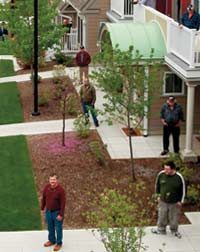By Brian Skeele, on July 11th, 2011
AARP’s July-August 2011 issue highlights a newly constructed attached units community within a program called Soldier On. With solar panels on the roof, and economic and social support systems, 39 veterans are experiencing their lives transformed.
This is a great example of the kinds of qualities found in what I call a Sustainable Urban Village-social, economic, and ecological sustainability in action. Enjoy.

once homeless, these veterans now own homes in their own Pittsfield, Mass. community
Formerly homeless with many years self medicating, they now have their own apartments, a share of the ownership, and a voice in how the place is run. The rents, from $580 tp $682 are partically subsidizied by HUD and the Dept of Veterans Affairs.
Each resident had to pay $2500 to buy a limited-equity ownership in the development. Local banks have offered to lend them the downpayment money interest free, if necessary. If money is left over at the end of the year after all the bills are paid, each resident/owner gets his share of the rebate. This year each got a $2100 rebate, after paying approximately $7000 in rent.
A substance abuse counselor, as well as job-training and medical services are available and often are delivered to their apartment, or the transitional shelter building next door. A Local bank sponsors one-on-one money management sessions. Rides are available to go job interviews, and to a support service, as only 17%of the men have driver’s licences…
Residents are held accountable for their actions, but if they don’t toe the line, there is collective soul-searching rather than finger-pointing. If they skip their rent payment, for instance, the board of directors and staff will work with them to find ways to catch up and be punctual in the future. That might mean meeting with the local bank to work on their budget or come up with a payment plan or having fellow vets remind them why rent money gets paid before a flat-screen TV purchase. One thing the board doesn’t plan on doing is evicting them.
It’s a similar philosophy if a vet has an alcohol or drug relapse. Rather than play tough guy and threaten punishment or throw them out, as some programs do, “we say, ‘What haven’t we done to build a relationship of trust with you?’ ” says Downing. “We don’t see them as failures, but rather take responsibility for their failure. We’ll do whatever it takes to make them successful.”
Vets living here own and run several businesses. A construction crew of six which goes out into the community everyday. Other’s speak to youth about their lives.
Being in Soldier On’s program and giving back to the community transforms the formerly homeless veterans’ self images and their lives. “A good neighborhood makes a good home”, Lenny Costa, a former junkie. After 31 years of not seeing his daughter, and because of all the work he has done on himself with Soldier On’s support, he has reunited with her and his granddaughter. This last Father’s Day he got his first Father’s Day Card.
This, is how we make sustainable real!
Image Courtesy of AARP
